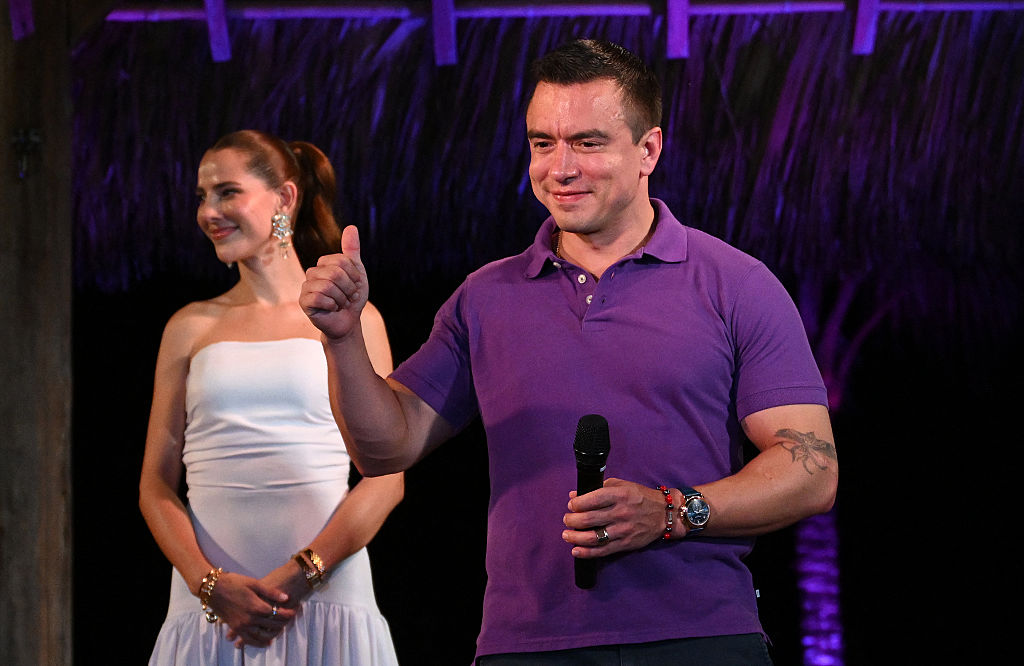President Daniel Noboa was elected to his first full four-year term on April 13 after defeating Luisa González by a wider-than-expected 11-point margin, according to the country’s National Electoral Council.
González, running with the Citizens’ Revolution (RC) party and backed by former President Rafael Correa, is disputing the result, alleging election fraud. Pre-election polling showed a tight race.
Noboa, 37, won a special presidential election in October 2023 to finish his predecessor’s mandate. In his reelection bid, he campaigned primarily on aggressive military and police operations to crack down on the violent crime that has been surging in Ecuador over the past few years, and in the run-up to the election distributed payments to citizens affected by a major oil spill and small businesses affected by flooding.
The day before the vote, Noboa declared a 60-day state of emergency in seven of 24 provinces, including the capital and several areas where González is especially popular. The decree restricts civil liberties and expands law enforcement powers, which raised concerns of voter suppression. Noboa will be sworn in on May 24.
AQ asked analysts to share their reactions and perspectives.

Sebastián Hurtado
Founder and president of PRóFITAS, a political risk consultancy based in Quito
Despite mounting crises, Ecuadorian voters handed incumbent President Daniel Noboa a larger-than-expected victory on Sunday. Rising violence, economic stagnation, and a year of improvisational governance did not stop the 37-year-old leader from presenting himself as a vehicle for change—particularly when contrasted with his opponent, Luisa González from the correísta Citizens’ Revolution (RC) movement. Noboa is now the second president in the nation’s democratic history to win a consecutive election, a feat made more remarkable by the dire political and economic context.
González struggled to distance herself from Correa’s increasingly radical legacy and controversial alliances, particularly with Venezuela’s Nicolás Maduro. Late-campaign missteps—ambiguous remarks on dollarization and security “peace groups” perceived publicly as linked to Cuban or Venezuelan models—undermined her credibility and intensified fears regarding the return of correísmo.
Noboa, meanwhile, actively utilized the presidency. In the final weeks, his government distributed direct transfers to communities affected by disaster and expanded social programs. The administration also used national media broadcasts to promote its security plans. Although the lines between governing and campaigning blurred, the National Electoral Council (CNE)—widely regarded as favorable to Noboa—did not intervene.
Geographic voting shifts played a significant role in the outcome and warrant closer examination. Noboa notably improved his performance in coastal provinces—even in areas hard hit by insecurity—while González underperformed in core strongholds, ultimately delivering RC its worst result in history. Her decision to contest the results is unlikely to gain traction, even among her base. For the Citizens’ Revolution, this defeat marks a turning point. Once the dominant political force in Ecuador, the movement faces deep questions about its relevance, its disconnect from voters, and whether Rafael Correa’s legacy has become more of a burden than an asset. The result could create space for the emergence of new progressive actors unencumbered by the past.
While serious concerns remain about Noboa’s undefined political project beyond opposition to correísmo and a tough-on-crime policy, his re-election offers a few notable advantages for Ecuador’s governance. The result ensures short-term policy continuity and avoids the potential disruptions of an abrupt political shift. Noboa is likely to double down on pro-business policies, deepen ties with the IMF and foreign investors, and pursue hardline security strategies with support from international partners—especially the U.S. He is also well-positioned to build a working majority in the National Assembly, giving him the legislative backing needed to pursue long-overdue reforms. Perhaps most importantly, a full four-year mandate may allow him to attract higher-caliber officials and technocrats to his new administration—a persistent weakness during his transitional government.
Ultimately, Ecuadorians made a leap of faith—not in recognition of achievements, but in hoping for something better. Noboa now has a mandate, time, and political tools. Whether he can deliver effective change remains to be seen.

María Teresa Escobar
Freelance journalist based in Quito
With his victory on April 13, President Daniel Noboa delivered the third consecutive defeat to former President Rafael Correa’s populist Revolución Ciudadana (RC) in a presidential election.
The RC might have taken a hit, but it remains a significant political force, contributing to Noboa’s increasing list of challenges. While no party secured the 76 seats required for an absolute majority in the National Assembly after February’s legislative elections, the RC-Reto coalition obtained 67 seats, and the president’s Acción Democrática Nacional (ADN) holds 66. Nonetheless, Noboa now has the advantage to negotiate alliances.
Elected in 2023 to complete former President Guillermo Lasso’s tenure after the latter cut his term short, Noboa faces perhaps the toughest period in the history of the troubled Andean nation of 18 million people.
For now, market-oriented economists and supporters of Ecuador’s dollarization sighed in relief. Talks with the IMF will soon be resumed as part of a $4 billion credit program devised to ease Ecuador’s public debt payments.
A tax reform is expected to increase public revenue, and the administration is better positioned to pursue long-term deals with private investors to boost the country’s shrinking oil output.
But amid violence and a still unresolved energy crisis that left Ecuadorians enduring 12-hour power cuts in the last quarter of 2024, achieving Noboa’s promised 4% GDP growth this year and maintaining fiscal discipline remain major tests for an administration already facing an uphill battle.
In Noboa’s new term, which will extend to May 2029, citizens expect to see radical action to combat violence. Many Ecuadorians consider violence and insecurity their primary concerns, and Noboa’s popularity will hinge on the success of his Phoenix security plan. Since 2019, Ecuador has been plunged into a violent conflict against criminal gangs driven by cocaine and gun smuggling, human trafficking, extortion, money laundering, and illegal gold mining.
During his presidential campaign, Noboa announced an agreement with the U.S.-based military contractor Erik Prince to train Ecuador’s security forces as part of his Phoenix Plan. Noboa’s plan also involves constructing a naval facility in the coastal city of Manta to eventually host U.S. troops. In 2008, Correa ordered U.S. troops to vacate a military base in Manta.
It will take a long-term multi-institutional strategy to dismantle the financial, logistical, political, and social structures that facilitate a wide range of illegal activities in Ecuador. Whether Noboa’s administration has the capability or the political room to successfully carry out a series of reforms and institutional efforts to disarticulate complex criminal dynamics is yet to be seen.

Alejandro Arreaza
Andean economist at Barclays
President Daniel Noboa had an impressive comeback. After winning the first round by a slim margin, and with polls suggesting a tight runoff election, his victory was much wider than expected. Although economic challenges are mounting, this result should at least help to dissipate concerns over the government’s commitment to a reform agenda and willingness to meet its obligations.
A dispute over the result still creates some uncertainty. The correísta candidate, Luisa González, has not conceded. She is claiming fraud, but so far has not presented any evidence. A third consecutive defeat in a presidential election is a strong setback for correísmo, seeming to confirm the electorate’s rejection of the social model the movement represents. Considering that Noboa focused his campaign narrative on fostering anti-Correa sentiment, it could be argued that the outcome was mainly a vote against correísmo. At the same time, this does not necessarily mean a blank check for Noboa or an explicit backing of his agenda. But still, a victory by such a large margin should boost the president’s political capital and widen his room for maneuver to implement his policies and to continue to advance Ecuador’s IMF program. In February’s legislative elections, Noboa’s party (ADN) increased its number of seats in the National Assembly, which should offer him the possibility to form a working coalition in the new legislature.
So far, the Noboa administration has over-complied with the IMF program’s targets. Relative to the alternative scenario of a victory for González, whose policy proposals were inconsistent with the IMF program and, in our view, could have compromised the country’s ability to meet its obligations, a continuity scenario should ease any concerns on this front. Nonetheless, some uncertainty remains, as the recent drop in oil prices means a bigger fiscal adjustment will be necessary, government liquidity will be tighter, and Ecuador faces a tight timeline ahead of the bond amortization due in January 2026.
In the short run, the Noboa administration has an opportunity to access funding options that could gradually reduce the uncertainties over its capacity to repay the country’s debts, while also trying to open a path to tackle structural issues in the medium term. It has already expressed interest in a Resilience and Sustainability Facility (RSF) from the IMF, which could provide approximately $1.3 billion in funding over the next two years, in addition to what is already included in the existing program. Given the support that Noboa has among multilateral organizations, as well as in the Trump administration, he could look to secure financial guarantees that could be used to lower funding costs and access private funding or conduct liability management exercises similar to those of last year, and/or he could bring the concession of the Sacha oilfield back on the table in discussions with oil companies, which could provide up to $1.5 billion.

Laura Lizarazo
Associate director for the Andean region in Control Risks’ Global Risk Analysis practice
On April 13, President Daniel Noboa was re-elected with an 11-point lead—approximately 1.1 million votes—over leftist challenger Luisa González, representing former President Rafael Correa’s political movement, correísmo. With 97% of votes counted, Noboa won in 19 of Ecuador’s 24 provinces, including Indigenous-majority areas in the Amazon and Sierra regions. González prevailed only in coastal provinces Esmeraldas, Santa Elena, and Los Ríos, correísmo stronghold Manabí, and the Amazonian province of Sucumbíos.
This marks the third consecutive runoff presidential defeat for correísmo since 2021, underscoring key dynamics in Ecuadorian politics. First, there is a persistent and intense rejection of the left’s return to power. Voters continue to back candidates seen as most capable of blocking correísmo’s comeback—regardless of ideology, leadership style, or policy agenda.
Noboa’s victory appears less a reflection of his governance or campaign strength than a strategic vote against Correa’s Revolución Ciudadana (RC). The left has a clear voting cap that it is increasingly unlikely to break, as Correa becomes an increasingly distant political figure, and his legacy becomes even blurrier in the eyes of a new generation of voters.
Second, the Indigenous electorate is far from monolithic. Despite an endorsement from Leonidas Iza—president of the Ecuadorian Confederation of Indigenous Nationalities, CONAIE and third-place finisher in the first round under the Indigenous Pachakutik party—many Indigenous communities rejected González. This reflects lasting distrust rooted in Correa’s contentious relationship with Indigenous groups, especially regarding extractive policies and environmental issues in the Amazon. The results suggest these tensions remain unresolved.
Finally, the election highlights regional divides in attitudes toward security policies. With the exception of Guayas province, voters in coastal areas most affected by organized crime (where Noboa has concentrated his militarized, hardline security measures) largely favored González. This signals possible discontent with his heavy-handed approach and a desire for alternative strategies—including heavier investment in social policies—to address escalating violence.
González’s allegations of fraud are unlikely to prevent Noboa’s taking office in May. Even if some vote tallies were effectively tampered with, lost, or destroyed and this is duly proven before electoral bodies, it is highly unlikely that such irregularities are systemic or significant enough to impact over a million votes and revert the outcome.
However, González’s fraud allegation is likely to set the tone for the relationship between the government and the RC party in the National Assembly, where neither holds a majority. As the only party in Ecuador with a relatively stable voter base and a solid organizational structure, RC is likely to oppose Noboa’s legislative agenda as a unified bloc. This will pose significant governability challenges in his second term, where he will have to compromise with Pachakutik and the Social Christian Party to advance his legislative agenda.





